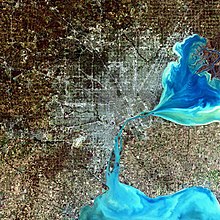Water privatization in the United States
[1] As of 2011, over three quarters of US local governments surveyed by the ICMA (International City/County Management Association) provide water distribution entirely with public employees.
Additionally, the private companies tended to focus more on profit maximization than on the quality and quantity of service provided because water is a natural monopoly.
Therefore, we require savvy, farreaching, effective government oversight of our water supplies and facilities for their security.
"[3] Furthermore, some argue that the privatization of water gives up governmental control of a good that is essential to life and is ethically wrong.
[5][6] Private water companies have existed in the United States for more than 200 years and number in the thousands today.
[7] According to the National Association of Water Companies (NAWC), more than 2,000 facilities operate in public-private partnership contract arrangements.
[15] Private water companies enable communities to gain access to needed capital for infrastructure investment.
A summary of their conclusions follows: "While many states and localities are turning to privatization as a way to provide services to their citizens, surprisingly little is known about these choices.
[3] The experiences in Detroit provide some perspective on what happens with corrupt government related to public or private participation.
Due to the horse trading, shoddy contracting practices, and other forms of corruption this Detroit case may be a good example of government failure in the water system arena.
[31] As of 24 June 2014[update], the Detroit Water and Sewerage Department is "an estimated $5 billion in debt and has been the subject of privatization talks ... [it] says half of its 323,000 accounts are delinquent and has begun turning off the taps of those who do not pay bills that total above $150 or that are 60 days late.
"[32] Activists have criticized these actions, saying "Detroit is trying to push through a private takeover of its water system at the expense of basic rights."
Many Emmaus residents organized themselves under the group EFLOW ("Emmaus for Locally Owned Water"), and through a combination of letter-writing, petitioning and public comment at council meetings, in early September 2005 the council voted to take water privatization off the table of options.
This controversy garnered regional and national attention, with anti-privatization non-profits such as Public Citizen noting the debate and outcome.

